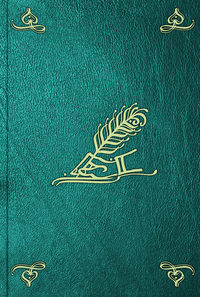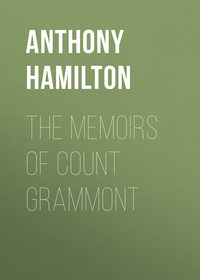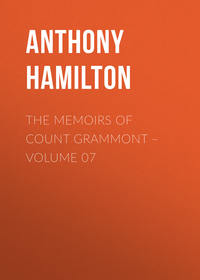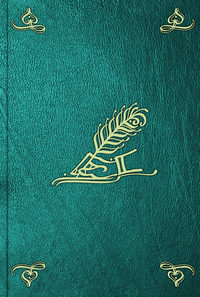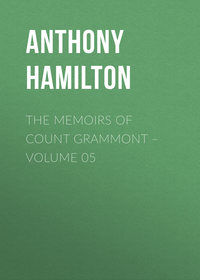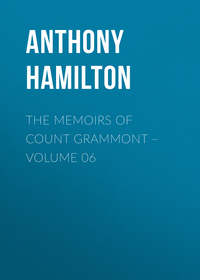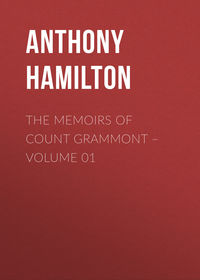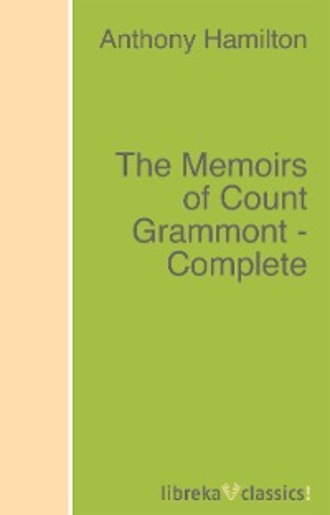
Полная версия
The Memoirs of Count Grammont - Complete
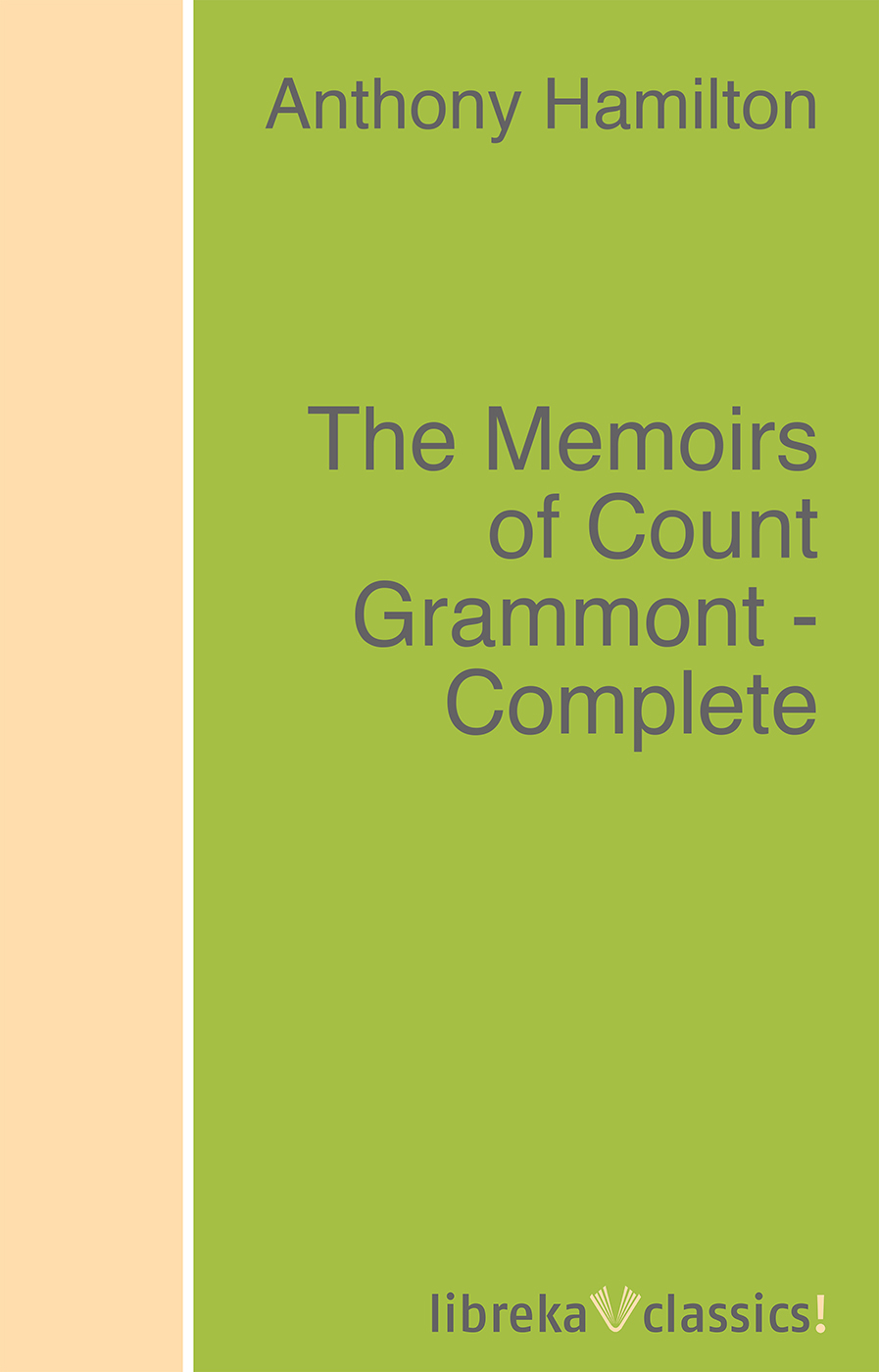

Titel: The Memoirs of Count Grammont — Complete
von Oliver Goldsmith, Samuel Pepys, William Dean Howells, John Burroughs, William Harmon Norton, L. Mühlbach, Franklin Knight Lane, Walter Pater, Jonathan Swift, Augusta J. Evans, Trumbull White, Kathleen Thompson Norris, Matthew Arnold, Charles W. Colby, Shakespeare, James Fenimore Cooper, D. H. Lawrence, James Joyce, Ada Cambridge, Philip E. Muskett, Catherine Helen Spence, Rolf Boldrewood, Ernest Scott, Fergus Hume, H. G. Wells, Victor [pseud.] Appleton, Roald Amundsen, Max Simon Nordau, Henry David Thoreau, E. Phillips Oppenheim, Richard Wagner, Franz Liszt, Charlotte Mary Yonge, Charles Henry Eden, Charles Babbage, T. R. Malthus, Unknown, Joseph Ernest Morris, Robert Southey, Isabella L. Bird, Charles James Fox, Thomas Hariot, Cyrus Thomas, Bart Haley, Christopher Morley, Edgar Saltus, Marie Corelli, Edmund Lester Pearson, Robert Browning, John Aubrey, Benjamin Nathaniel Bogue, John McElroy, John Galsworthy, Henry James, Hamilton Wright Mabie, Mina Benson Hubbard, Elizabeth Cleghorn Gaskell, John Keble, Henry Lindlahr, Richard Henry Dana, Annie Wood Besant, Immanuel Kant, John Habberton, Baron Edward John Moreton Drax Plunkett Dunsany, T. B. Ray, Isabel Ecclestone Mackay, Frank C. Haddock, William John Locke, baron Arthur Léon Imbert de Saint-Amand, Ralph Centennius, United States, Library of Congress. Copyright Office, James Otis, George Hartmann, Sir Arthur Conan Doyle, George Gissing, John Henry Tilden, Thomas Wright, Frederick Samuel Dellenbaugh, Anonymous, J. Clontz, David Hume, Margot Asquith, Elmer Ulysses Hoenshel, Byron J. Rees, Lida B. McMurry, Georges Duhamel, Ramsay Muir, Edith Wharton, Charles Sturt, Lola Ridge, J. M. Stone, Annie Payson Call, Grant Allen, kniaz Petr Alekseevich Kropotkin, Steve Solomon, Isabel Moser, Aleksandr Sergeevich Pushkin, Horace W. C. Newte, Charles Darwin, Maurice Maeterlinck, Walter Bagehot, Henri Bergson, George Randolph Chester, John S. C. Abbott, L. Frank Baum, William T. Sherman, Philip Henry Sheridan, Friedrich Wilhelm Nietzsche, Ambrose Bierce, Ulysses S. Grant, F. Scott Fitzgerald, Alfred Lichtenstein, Abbot of Nogent-sous-Coucy Guibert, Nellie L. McClung, Alice Caldwell Hegan Rice, E. Nesbit, Henri Barbusse, J. M. Synge, Frank Norris, Louis Hémon, Henry Van Dyke, Thomas Guthrie Marquis, Susanna Moodie, Frank Bigelow Tarbell, René Descartes, Kirk Munroe, Francis Hopkinson Smith, Edna St. Vincent Millay, Talbot Mundy, George Meredith, Clemens Brentano, James De Mille, James Allen, Norman Douglas, Bolton Hall, Arthur Christopher Benson, James Oliver Curwood, Frank Jardine, Bertram Lenox Simpson, Freiherr von Justus Liebig, Cyril G. Hopkins, Mary Eleanor Wilkins Freeman, Evelyn Scott, Charles Monroe Sheldon, George Berkeley, Steven Sills, Sara Jeannette Duncan, Jules Verne, Irvin S. Cobb, Zane Grey, August von Kotzebue, John Addington Symonds, Marjorie Allen Seiffert, J. B. Bury, William Makepeace Thackeray, Jules Renard, Susan Coolidge, Huguette Bertrand, Mrs. C. F. Fraser, Ottilie A. Liljencrantz, William Morton Payne, Henry Adams, T. S. Arthur, Orison Swett Marden, T. S. Ackland, Anthony Trollope, graf Leo Tolstoy, Robert Smythe Hichens, Émile Gaboriau, Wilkie Collins, Charles Reade, Horace Walpole, Jennette Lee, Thomas Dykes Beasley, Inez Haynes Gillmore, L. H. Woolley, John Francis Davis, James B. Stetson, William Day Simonds, James O'Meara, Almira Bailey, Cuthbert Bede, Voltaire, Percy Bysshe Shelley, William Bennett Munro, Sir Richard Francis Burton, Horatio Alger, Paul Verlaine, Samuel Vaknin, William Ralph Inge, Madame de Staël, J. Hector St. John de Crèvecoeur, L. A. Abbott, F. Colburn Adams, John S. Adams, Thornton W. Burgess, Glenn D. Bradley, Eugen Neuhaus, Arthur E. Knights, Bret Harte, Maturin Murray Ballou, Jane G. Austin, Samuel Johnson, Frederick Niecks, Stephen Leacock, Suelette Dreyfus, Stéphane Mallarmé, Lyndon Orr, William Le Queux, Mary Wollstonecraft Shelley, Jeannie Gunn, Jean François Regnard, John Ruskin, A. I. Kuprin, Pierre Louÿs, George Barr McCutcheon, John Munro, Holman Day, William Stearns Davis, John Richardson, Mary Jane Holmes, Oliver Wendell Holmes, Finley Peter Dunne, C. J. Dennis, Ethel Sybil Turner, Julius Wellhausen, Arnold Bennett, Harold Bell Wright, Guðmundur Kamban, Charles Stuart Calverley, A. E. W. Mason, Charles Rivière Dufresny, David Starr Jordan, Wallace Irwin, J. W. Wright, Thomas Hardy, United States Rubber Company, Helen Reimensnyder Martin, William Fayette Fox, Lewis Carroll, Anna Katharine Green, Shell Union Oil Corporation, Louisa May Alcott, Theocritus, of Phlossa near Smyrna Bion, Moschus, Bertrand Russell, Guy de Maupassant, Henrik Ibsen, James Whitcomb Riley, Josephine Lawrence, Pierre Loti, Harry Alverson Franck, Albert Payson Terhune, Harold MacGrath, G. A. Henty, Harriet A. Adams, John Lothrop Motley, H. E. Bird, Joseph Crosby Lincoln, Michel Baron, Gene Stratton-Porter, James Clerk Maxwell, Norman Lindsay, Edward Lasker, Margaret Penrose, S. R. Crockett, Austin Hall, Homer Eon Flint, Various, Clarence Edward Mulford, Upton Sinclair, John Andreas Widtsoe, Thomas Bulfinch, David Graham Phillips, John Kendrick Bangs, Edmond Jaloux, Emile Littré, 13th cent. de Boron Robert, Samuel Butler, James Huneker, Jessie Graham [pseud.] Flower, St. George Rathborne, Charles Wesley Emerson, Winston Churchill, Edith Bancroft, Lloyd Osbourne, Jack London, Lyman Abbott, Belle K. Abbott, Sinclair Lewis, H. W. Conn, Ludwig Thoma, Sir Walter Scott, August Strindberg, Thomas Chapais, Ernest Giles, David Wynford Carnegie, Zoeth Skinner Eldredge, Eusebius Joseph Molera, C. C. Andrews, Robert Barr, John Hendricks Bechtel, Robert W. Chambers, Alice B. Emerson, Anna M. Galbraith, Laura Lee Hope, L. T. Meade, Harry Steele Morrison, Frank Gee Patchin, Louise Clarke Pyrnelle, William MacLeod Raine, Roy Rockwood, Edward Stratemeyer, Louis Tracy, Matthew White, Leonardo da Vinci, Albert Einstein, Clarence Young, Ludwig Leichhardt, Arthur B. Reeve, Mrs. Georgie Sheldon, Samuel Hopkins Adams, George Washington, John Adams, Thomas Jefferson, James Madison, James Monroe, John Quincy Adams, Andrew Jackson, Martin Van Buren, John Tyler, James K. Polk, Zachary Taylor, Millard Fillmore, Franklin Pierce, James Buchanan, Abraham Lincoln, Andrew Johnson, Rutherford Birchard Hayes, Chester Alan Arthur, Grover Cleveland, Benjamin Harrison, William McKinley, Theodore Roosevelt, William H. Taft, Woodrow Wilson, Warren G. Harding, Calvin Coolidge, Herbert Hoover, Franklin Delano Roosevelt, Harry S. Truman, Dwight D. Eisenhower, John F. Kennedy, Lyndon B. Johnson, Richard M. Nixon, Gerald R. Ford, Jimmy Carter, Ronald Reagan, George Bush, William Jefferson Clinton, George W. Bush, United States. Presidents., Bjørnstjerne Bjørnson, Rex Ellingwood Beach, Euripides, Henry C. Northam, Mary Raymond Shipman Andrews, Alice Brown, Mary Stewart Doubleday Cutting, Elizabeth Garver Jordan, Elizabeth Stuart Phelps, Mary Heaton Vorse, Edith Wyatt, Bernard Shaw, Georg Büchner, Mrs. Alfred Gatty, Henry Mackenzie, Thomas Henry Huxley, Leonard Huxley, William Hazlitt, Arthur William Dunn, Baroness Emmuska Orczy Orczy, Standish O'Grady, J. M. Barrie, J. G Patterson, Alexandre Dumas père, Alphonse Daudet, Ignatius Donnelly, Henry A. Shute, Walter Savage Landor, E. J. Banfield, George Sand, Gustave Flaubert, William James, Charles Klein, J. Storer Clouston, John Fox, John Stuart Mill, Laurence Hope, Andrew Lang, Vaughan Kester, Molière, Baron George Gordon Byron Byron, Viscount Henry St. John Bolingbroke, Ben Jonson, Émile Zola, Thomas Stevens, Carl Ewald, Anatole France, Edward J. Wickson, Henry M. Stanley, Nicolas Boileau Despréaux, Selma Lagerlöf, Richard Marsh, W. B. Yeats, Ella Wheeler Wilcox, Henry Stevens, Gouverneur Morris, Kaiten Nukariya, Henry Rider Haggard, Frances Boyd Calhoun, George Crabbe, Bertram Waldrom Matz, Joseph A. Altsheler, Petronius Arbiter, F. Marion Crawford, Charles James Lever, John Payne, Harlan Page Halsey, Karl Philipp Moritz, Henry Cruse Murphy, Vingie E. Roe, Mabel C. Hawley, Walter Cox Green, Henry Fielding, Jeffery Farnol, Laura Elizabeth Howe Richards, Howard Roger Garis, Lilian Garis, Carolyn Wells, G. K. Chesterton, Mungo Park, Theodore Dreiser, Arthur Cheney Train, Edward Payson Roe, Robert Louis Stevenson, Asa Gray, Jean de La Fontaine, Frances Hodgson Burnett, Mary Noailles Murfree, Wolfgang Amadeus Mozart, J. S. Fletcher, Elinor Glyn, Jacob Grimm, Wilhelm Grimm, Kenneth Grahame, Wassily Kandinsky, Theodor Fontane, S. Baring-Gould, Johann Wolfgang von Goethe, E. Cherubini, Brett Page, Dom, John Oxley, William F. Drannan, Mark Rutherford, Adelbert von Chamisso, L. M. Montgomery, Edward John Eyre, Dorothy Canfield Fisher, F. H. King, Justin McCarthy, Myrtle Reed, Francis Grose, W. H. Hudson, Andrew Kennedy Hutchison Boyd, Count Anthony Hamilton
ISBN 978-3-7429-5253-0
Alle Rechte vorbehalten.
Es ist ohne vorherige schriftliche Erlaubnis nicht gestattet, dieses Werk im Ganzen oder in Teilen zu vervielfältigen oder zu veröffentlichen.
MEMOIRS OF COUNT GRAMMONT
By Anthony Hamilton
Edited, With Notes, By Sir Walter Scott
Contents
BIOGRAPHICAL SKETCH OF ANTHONY HAMILTON.
CHAPTER FIRST. INTRODUCTION CHAPTER SECOND. ARRIVAL OF THE CHEVALIER GRAMMONT AT THE SIEGE OF TRINO, AND THE LIFE HE LED THERE CHAPTER THIRD. EDUCATION AND ADVENTURES OF THE CHEVALIER GRAMMONT BEFORE HIS COMING TO THE SIEGE OF TRINO CHAPTER FOURTH. HIS ARRIVAL AT THE COURT OF TURIN, AND HOW HE SPENT HIS TIME THERE CHAPTER FIFTH. HE RETURNS TO THE COURT OF FRANCE—HIS ADVENTURES AT THE SIEGE OF ARRAS—HIS REPLY TO CARDINAL MAZARIN—HE IS BANISHED THE COURT CHAPTER SIXTH. HIS ARRIVAL AT THE ENGLISH COURT—THE VARIOUS PERSONAGES OF THIS COURT CHAPTER SEVENTH. HE FALLS IN LOVE WITH MISS HAMILTON—VARIOUS ADVENTURES AT THE BALL IN THE QUEEN'S DRAWING-ROOM—CURIOUS VOYAGE OF HIS VALET-DE-CHAMBRE TO AND FROM PARIS CHAPTER EIGHTH. FUNNY ADVENTURE OF THE CHAPLAIN POUSSATIN—THE STORY OF THE SIEGE OF LERIDA—MARRIAGE OF THE DUKE OF YORK, AND OTHER DETAILS ABOUT THE ENGLISH COURT CHAPTER NINTH. VARIOUS LOVE INTRIGUES AT THE ENGLISH COURT CHAPTER TENTH. OTHER LOVE INTRIGUES AT THE ENGLISH COURT CHAPTER ELEVENTH. RETURN OF THE CHEVALIER GRAMMONT TO FRANCE—HE IS SENT BACK TO ENGLAND—VARIOUS LOVE INTRIGUES AT THIS COURT, AND MARRIAGE OF MOST OF THE HEROES OF THESE MEMOIRS
BIOGRAPHICAL SKETCH OF ANTHONY HAMILTON.
Anthony Hamilton, the celebrated author of the Grammont Memoirs, much cannot now be with certainty known.
The accounts prefixed to the different editions of his works, down to the year 1805, are very imperfect; in that year a new, and, in general, far better edition than any of the preceding ones, was published in Paris, to which a sketch of his life was also added; but it contains rather just criticisms on his works, than any very novel or satisfactory anecdote concerning himself. It is not pretended here to gratify literary curiosity as fully as it ought to be, with regard to this singular and very ingenious man; some effort, however, may be made to communicate a few more particulars relative to him, than the public has hitherto, perhaps, been acquainted with.
Anthony Hamilton was of the noble family of that name: Sir George Hamilton, his father, was a younger son of James, Earl of Abercorn, a native of Scotland. His mother was daughter of Lord Thurles, and sister to James, the first Duke of Ormond; his family and connections therefore, on the maternal side, were entirely Irish. He was, as well as his brothers and sisters, born in Ireland, it is generally said, about the year 1646; but there is some reason to imagine that it was three or four years earlier. The place of his birth, according to the best family accounts, was Roscrea, in the county of Tipperary, the usual residence of his father when not engaged by military or public business.
It has been always said, that the family migrated to France when Anthony was an infant; but this is not the fact: "Sir George Hamilton," says Carte, "would have accompanied his brother-in-law, the Marquis of Ormond, to France, in December, 1650: but, as he was receiver-general in Ireland, he stayed to pass his accounts, which he did to the satisfaction of all parties, notwithstanding much clamour had been raised against him." When that business was settled, he, in the spring of 1651, took Lady Hamilton and all his family to France, and resided with Lord and Lady Ormond, near Caen, in Normandy, in great poverty and distress, till the Marchioness of Ormond, a lady whose mind was as exalted as her birth, went over to England, and, after much solicitation obtained two thousand pounds a year from her own and, her husband's different estates in Ireland.
This favour was granted her by Cromwell, who always professed the greatest respect for her. The Marchioness resided in Ireland, with the younger part of her family, from 1655 till after the Restoration; while the Marquis of Ormond continued for a considerable part of that period with his two sisters, Lady Clancarty and Lady Hamilton, at the Feuillatines, in the Faubourg St. Jacques, in Paris.
It appears from a letter of the Marquis to Sir Robert Southwell, that, although he himself was educated in the Protestant religion, not only his father and mother, but all his brothers and sisters, were bred, and always continued, Roman Catholics. Sir George Hamilton also, according to Carte, was a Roman Catholic; Anthony, therefore, was bred in the religion of his family, and conscientiously adhered to it through life.
He entered early into the army of Louis XIV., as did his brothers George, Richard, and John, the former of whom introduced the company of English gens d'armes into France, in 1667, according to Le Pere Daniel, author of the History of the French Army, who adds the following short account of its establishment: Charles II., being restored to his throne, brought over to England several catholic officers and soldiers, who had served abroad with him and his brother, the Duke of York, and incorporated them with his guards; but the parliament having obliged him to dismiss all officers who were Catholics, the king permitted George Hamilton to take such as were willing to accompany him to France, where Louis XIV. formed them into a company of gens d'armes, and being highly pleased with them, became himself their captain, and made George Hamilton their captain-lieutenant:—[They were composed of English, Scotch, and Irish.] Whether Anthony belonged to this corps I know not; but this is certain, that he distinguished himself particularly in his profession, and was advanced to considerable posts in the French service.
Anthony Hamilton's residence was now almost constantly in France. Some years previous to this he had been much in England, and, towards the close of Charles II.'s reign, in Ireland, where so many of his connections remained. When James II. succeeded to the throne, the door being then opened to the Roman Catholics, he entered into the Irish army, where we find him, in 1686, a lieutenant-colonel in Sir Thomas Newcomen's regiment. That he did not immediately hold a higher rank there, may perhaps be attributed to the recent accession of the king, his general absence from Ireland, the advanced age of his uncle, the Duke of Ormond, and, more than all, perhaps, to his Grace's early disapprobation of James's conduct in Ireland, which displayed itself more fully afterwards, especially in the ecclesiastical promotions.
Henry, Earl of Clarendon, son to the lord-chancellor, was at that time lord-lieutenant of Ireland, and appears, notwithstanding his general distrust and dislike of the Catholics, to have held Anthony Hamilton in much estimation: he speaks of his knowledge of, and constant attention to, the duties of his profession; his probity, and the dependance that was to be placed on him, in preference to others of the same religious persuasion, and, in October, 1686, wrote to the Earl of Sunderland respecting him, as follows: "I have only this one thing more to trouble your lordship with at present, concerning Colonel Anthony Hamilton, to get him a commission to command as colonel, though he is but lieutenant-colonel to Sir Thomas Newcomen, in regard of the commands he has had abroad: and I am told it is often done in France, which makes me hope it will not be counted an unreasonable request. I would likewise humbly recommend to make Colonel Anthony Hamilton a privy-councillor here." Lord Clarendon's recommendations were ultimately successful: Hamilton was made a privy-councillor in Ireland, and had a pension of L200 a year on the Irish establishment; and was appointed governor of Limerick, in the room of Sir William King, notwithstanding he had strongly opposed the new-modelling of the army by the furious Tyrconnel. In the brief accounts which have been given of his life, it is said that he had a regiment of infantry; but, though this is very probable, there is no mention whatever of his commanding a regiment in the lists published of King James's army, which are supposed to be very accurate: he is indeed set down among the general officers. Lord Clarendon, in one of his letters to the lord-treasurer, states, "That the news of the day was, that Colonel Russell was to be lieutenant-colonel to the Duke of Ormond's regiment, and that Colonel Anthony Hamilton was to have Russell's regiment, and that Mr. Luttrell was to be lieutenant-colonel to Sir Thomas Newcomen, in the place of Anthony Hamilton." It is not known whether Anthony was present at the battle of the Boyne, or of Aughrim: his brother John was killed at the latter; and Richard, who was a lieutenant-general, led on the cavalry with uncommon gallantry and spirit at the Boyne it is to be wished that his candour and integrity had equalled his courage; but, he acted with great duplicity; and King William's contemptuous echoing back his word to him, when he declared something on his honour, is well known: He is frequently mentioned by Lord Clarendon, but by no means with the same approbation as his brother. After the total overthrow of James's affairs in Ireland, the two brothers finally quitted these kingdoms, and retired to France. Richard lived much with the Cardinal de Bouillon, who was the great protector of the Irish in France, and kept (what must have been indeed highly consolatory to many an emigrant of condition) a magnificent table, which has been recorded in the most glowing and grateful terms, by that gay companion, and celebrated lover of good cheer, Philippe de Coulanges, who occasionally mentions the "amiable Richard Hamilton" as one of the cardinal's particular intimates. Anthony, who was regarded particularly as a man of letters and elegant talents, resided almost entirely at St. Germain: solitary walks in the forest of that place occupied his leisure hours in the morning; and poetical pursuits, or agreeable society, engaged the evening: but much of his time seems to have rolled heavily along; his sister, Madame de Grammont, living more at court, or in Paris, than always suited his inclinations or his convenience. His great resource at St. Germain was the family of the Duke of Berwick (son of James II.): that nobleman appears to have been amiable in private life, and his attachment to Hamilton was steady and sincere. The Duchess of Berwick was also his friend. It is necessary to mention this lady particularly, as well as her sisters: they were the daughters of Henry Bulkeley, son to the first viscount of that name: their father had been master of the household to Charles: their mother was Lady Sophia Stewart, sister to the beautiful Duchess of Richmond, so conspicuous in the Grammont Memoirs. The sisters of the Duchess of Berwick were Charlotte, married to Lord Clare, Henrietta, and Laura. They all occupy a considerable space in Hamilton's correspondence, and the two last are the ladies so often addressed as the Mademoiselles B.; they are almost the constant subjects of Hamilton's verses; and it is recorded that he was a particular admirer of Henrietta Bulkeley; but their union would have been that of hunger and thirst, for both were very poor and very illustrious: their junction would, of course, have militated against every rule of common prudence. To the influence of this lady, particularly, we are indebted for one or two of Hamilton's agreeable novels: she had taste enough to laugh at the extravagant stories then so much in fashion, "plus arabes qu'en Arabie," as Hamilton says; and he, in compliance with her taste, and his own, soon put the fashionable tales to flight, by the publication of the 'Quatre Facardins', and, more especially, 'La Fleur d'Epine'.
Some of the introductory verses to these productions are written with peculiar ease and grace; and are highly extolled, and even imitated, by Voltaire. La Harpe praises the Fleur d'Epine, as the work of an original genius: I do not think, however, that they are much relished in England, probably because very ill translated. Another of his literary productions was the novel called Le Belier, which he wrote on the following occasion: Louis XIV. had presented to the Countess of Grammont (whom he highly esteemed) a remarkably elegant small country house in the park of Versailles: this house became so fashionable a resort, and brought such constant visitors, that the Count de Grammont said, in his usual way, he would present the king with a list of all the persons he was obliged to entertain there, as more suited to his Majesty's purse than his own: the countess wished to change the name of the place from the vulgar appellation of Le Moulineau into that of Pentalie: and Hamilton, in his novel, wrote a history of a giant, an enchantment, and a princess, to commemorate her resolution. It has however happened that the giant Moulineau has had the advantage in the course of time; for the estate, which is situated near Meudon, upon the Seine, retains its original and popular designation.
About the year 1704, Hamilton turned his attention to collecting the memoirs of his brother-in-law, the Count de Grammont, as we may conjecture, from the epistle beginning "Honneur des rives eloignees" being written towards the close of the above year: it is dated, or supposed to be so, from the banks of the Garonne. Among other authors whom Hamilton at first proposes to Grammont, as capable of writing his life (though, on reflection, he thinks them not suited to it), is Boileau, whose genius he professes to admire; but adds that his muse has somewhat of malignity; and that such a muse might caress with one hand and satirize him with the other. This letter was sent by Hamilton to Boileau, who answered him with great politeness; but, at the same time that he highly extolled the epistle to Grammont, he, very naturally, seemed anxious to efface any impression which such a representation of his satiric vein might make on the Count's mind, and accordingly added a few complimentary verses to him: this letter is dated, Paris, 8th February, 1705. About the same time, another letter was written to Hamilton on the subject of the Epistle to Grammont, by La Chapelle, who also seemed desirous that his life should be given to the public, but was much perplexed which of the most celebrated ancients to compare the count to. Mecaenas first presented himself to his imagination: absurdly enough, in my opinion; for there was not a trace of similitude between the two characters. This, however, afforded him some opportunity, as he thought, of discovering a resemblance between Horace and Hamilton, in which he equally failed. Petronius is then brought forward, as affording some comparison to the Count;—a man of pleasure, giving up the day to sleep, and the night to entertainment; but then, adds La Chapelle, it will be suggested that, such is the perpetual activity of the Count of Grammont's mind, he may be said to sleep neither night nor day; and if Petronius died, the Count seems determined never to die at all. (He was at this time about eighty-five years of age.) It may well be supposed that all this, though now perfectly vapid and uninteresting, was extremely flattering to Grammont; and the result was, that he very much wished to have his life, or part of it, at least, given to the public. Hamilton, who had been so long connected with him, and with whose agreeable talents he was now so familiarized, was, on every account, singled out by him as the person who could best introduce him historically to the public. It is ridiculous to mention Grammont as the author of his own Memoirs: his excellence, as a man of wit, was entirely limited to conversation. Bussy Rabutin, who knew him perfectly, states that he wrote almost worse than any one. If this was said, and very truly, of him in his early days, it can hardly be imagined that he would, when between eighty and ninety years of age, commence a regular, and, in point of style, most finished composition. Besides, independent of everything else, what man would so outrage all decorum as to call himself the admiration of the age? for so is Grammont extolled in the Memoirs, with a variety of other encomiastic expressions; although, perhaps, such vanity has not been without example. Hamilton, it is true, says that he acts as Grammont's secretary, and only holds the pen, whilst the Count dictates to him such particulars of his life as were the most singular, and least known. This is said with great modesty, and, as to part of the work, perhaps with great truth: it requires, however, some explanation. Grammont was more than twenty years older than Hamilton; consequently, the earlier part of his life could only have been known, or was best known, to the latter from repeated conversations, and the long intimacy which subsisted between them. Whether Grammont formally dictated the events of his younger days, or not, is of little consequence from his general character, it is probable that he did not. However, the whole account of such adventures as he was engaged in, from his leaving home to his interview with Cardinal Mazarin (excepting the character of Monsieur de Senantes, and Matta, who was well known to Hamilton), the relation of the siege of Lerida, the description of Gregorio Brice, and the inimitable discovery of his own magnificent suit of clothes on the ridiculous bridegroom at Abbeville; all such particulars must have been again and again repeated to Hamilton by Grammont, and may therefore be fairly grounded on the count's authority. The characters of the court of Charles II., and its history, are to be ascribed to Hamilton: from his residence, at various times, in the court of London, his connection with the Ormond family, not to mention others, he must have been well acquainted with them. Lady Chesterfield, who may be regarded almost as the heroine of the work, was his cousin-german.


